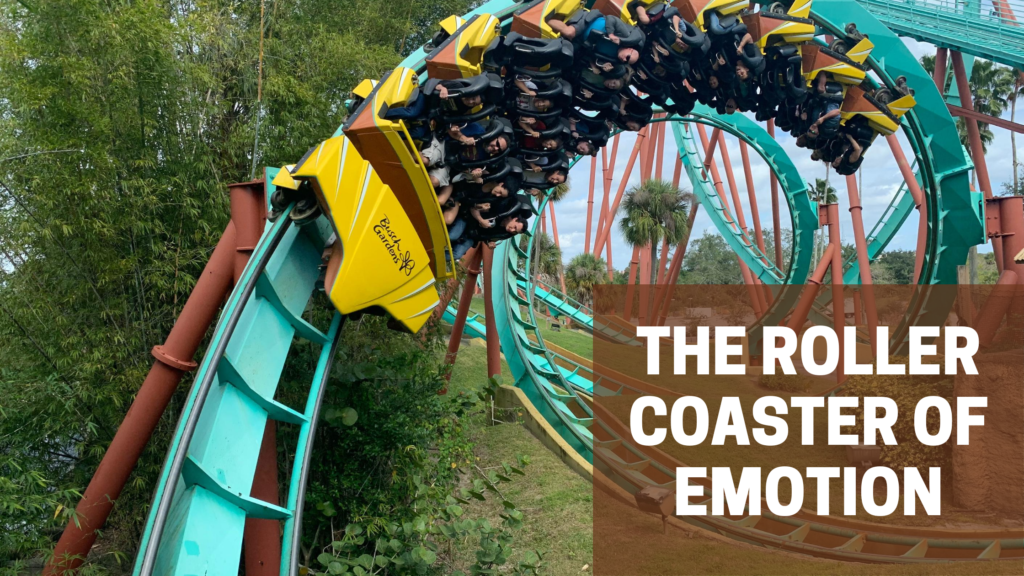Picture this – A little girl is at the carnival with her mommy. She skips along in her frilly pink polka-dot dress as she watches it bounce with each jump. She has pigtails that swing with her movements. She is delighted with all the lights, games, and fun going on, on such a special day. She takes a lick of her lollipop and giggles when the flavours consume her tongue.

Suddenly, two skateboarders whiz by her. As she turns to watch them, she drops her lollipop on the ground. She feels a flood of emotions overcome her.
What will she do? She might feel angry that she dropped her lollipop. She may feel sad that it’s all dirty and she can’t have it anymore. Or, she might burst into laughter because the skateboarders looked funny and she can’t decide what to feel about her lollipop.
This can be a typical scenario for a toddler. Their emotions usually change rapidly depending on what’s going on around them. They can be contentedly playing with a toy one minute. Then turn completely angry when another child takes their toy or plays their game. Then the next minute be singing, dancing, and playing with that same child.
We can feel similar after a concussion. Our emotions become unpredictable at the beginning. We could be laughing one minute and crying the next. Some people experience the emotional swing towards anger. I’ve heard some that go into random fits of laughter. While most, I would say, can lean towards the depressive side. I tend to be towards the latter, though I’ve experienced each of these.
Prior to your injury, you could categorize information into different parts of your brain. Depending on the activity, you might have used the occipital or back region of your brain. Other activities might have stimulated the front right-cortex. Now, if you were to lay in a functional-MRI scan, your post-concussive brain would all be lit up. It would show that you would use the majority of your brain for every activity you are trying to do.
This is why you tire out so easily with simple tasks. Your brain has been jumbled. So it is firing information to all areas of the brain rather than the required ones. Your brain is getting a full workout with every activity and conversation you have.
What does this break down to? Exhaustion and symptoms. Since your brain can’t comprehend the overload of information very long, it leads to a roller coaster of emotions. Just like how a toddler gets emotional or silly when he or she is overtired.
Our adult filter tends to go out the window and we react as a toddler does. We need naps. We need alone time. We need to learn how to process and handle our emotions all over again.
I’m sorry to those who are close to the concussed person, but please be patient. They can’t control it at the beginning. To the concussed person, you need to find out what your triggers are and find a balance.
Exhaustion is a big one. If you’ve been too stimulated and you feel the exhaustion setting in, go find some quiet time or take a nap. This will benefit you and others. If you’re feeling depressed, angry, or uncontrollably giddy, you’ve crossed the line and need to chill out for a while.

If you have a migraine or headache, this can often times cause anger to be your reaction. With the pain coursing through your head, it is harder to process anything. Don’t push through it if it is to this point. Again, go and rest.
I notice that if I’ve overdone it lately, I fall into feeling apathetic or depressive. I can find myself crying at silly things and wanting my husband Michael to stay with me a lot. I know I need to rest for a while if I’ve gotten to this point. That might mean taking a nap or spending a day in bed. If it’s really bad, I need to clear my schedule, minimize my activities and recuperate for the week.
This can be hard if you feel angry or depressive. This is the last thing you’d think would help you to get out of it. But it’s all signalling that your brain has had way too much stimulation lately and needs to repair itself in order to get your emotions and body back in check. Too much stress equals a constant fight-or-flight status. You will lose sleep and health if you stay in this too long. So, just like a toddler would need to, go put yourself in a time-out.
In order to not get stuck in a rut emotionally, you need to remind yourself of a few things while resting:
1) Rest is good for your body. It is helping it get healthy
2) This may be a setback, but you’re not back to where you started. You’re still moving forward.
3) You will not stay like this permanently. You are on the road to recovery and though it will take time, it will get better
4) Use this as a gauge to find your boundary line. If you’ve overdone it, find out what pushed you over and know that you’re not ready to do that much. Figure out where you need to say no to things for a time and use it as your motivation to work towards. Remember, bite sized pieces.
You can learn to control your emotions again but it takes time. Give yourself grace. Unlike how a toddler can take years to develop these skills, you can regain them much quicker. You need to be aware of what your body is telling you.
Don’t be consumed by watching every little symptom. But, if you notice your symptoms getting to an uncomfortable level or you want to sit on the floor and cry your eyes out, you’ve gone too far. Thankfully, some rest and scaling back on activities will actually help. A simple solution for a roller coaster ride of emotions. Let’s get off that ride and find a lollipop.




